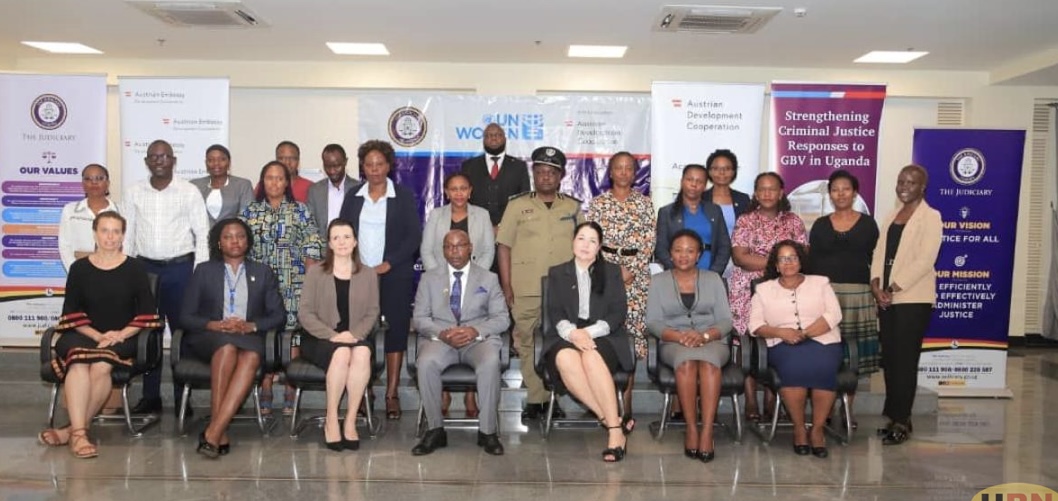Deputy Chief Justice Designate Dr. Flavian Zeija has officially launched the Justice 4Her Project, an initiative focused on ensuring full access to justice for survivors of gender-based violence (GBV), particularly women and girls.
The project seeks to dismantle barriers preventing survivors from accessing justice by promoting a survivor-centered approach. According to Dr. Zeija, the initiative reflects a commitment from justice stakeholders and development partners to ensure that justice is not a privilege for a select few but a fundamental right for all.
Dr. Zeija acknowledged that gender-based violence remains a global issue, and Uganda is no exception. Many women and girls continue to suffer in silence due to societal norms, economic constraints, and systemic inefficiencies. The Justice 4Her Project aims to address these challenges by strengthening the capacity of justice institutions to handle GBV cases effectively.
The project will be piloted in the High Court circuits of Gulu and Masaka, covering several Chief Magistrates Courts. Dr. Zeija emphasized the importance of multi-sectoral coordination, involving the government, civil society, legal professionals, and local communities, to ensure justice is delivered fairly and without bias.
Through the initiative, Dr. Zeija hopes to empower survivors by ensuring they feel heard, validated, and confident that their rights will be upheld. He believes the project’s success will require a fundamental shift in how justice institutions operate, demanding commitment from all involved.
On her part, Uganda’s Director of Public Prosecutions (DPP), Jane Frances Abodo, expressed concern over the rising cases of sexual and gender-based violence in the country. Despite legislative efforts, the number of reported cases continues to increase, with sexual offenses, particularly rape and aggravated defilement, dominating high court sessions. Additionally, many spousal murder cases that her office handles stem from unresolved domestic violence incidents that escalate into premeditated murders.
Abodo revealed that approximately 70% of criminal cases prosecuted by her office are GBV-related. However, she noted that many of these cases go unreported, and poor investigative practices often result in unsatisfactory outcomes, limited accountability for perpetrators, and a culture of impunity.
Dr. Kershbaumer also stressed the importance of addressing GBV, sharing the tragic case of 8-year-old Aminah, who was defiled by her cousins, resulting in the loss of her uterus. Despite receiving medical care and support, Aminah’s case was delayed due to corruption, and she passed away in 2024. The Justice 4Her Project aims to prevent such tragedies by ensuring survivors receive timely and effective justice. Dr. Kershbaumer called for improved coordination, cooperation, and communication among various sectors to make justice accessible, affordable, and unbiased for all, regardless of financial status.
She also expressed gratitude for the collaboration among different stakeholders and emphasized that justice delayed is justice denied. UN Women’s Programme Specialist on Women, Peace, and Security, Natasha Butorac, commended both the police and judiciary for their continuous efforts to combat GBV in Uganda. She also thanked the Austrian Government for funding the project.
Natasha highlighted the concerning rise in defilement cases reported by the Uganda Police Force between 2021 and 2024, although a slight decrease has been noted in recent reports. She pointed out that victims often face societal pressure to withdraw cases, further delaying justice and compounding the trauma.
The Justice 4Her project aims to enhance case management, provide justice for women and girls, and improve training for prosecutors. Natasha stressed that GBV remains a critical priority requiring urgent attention, and she expressed confidence that the collective efforts of stakeholders will help achieve the project’s objectives, which align with the Sustainable Development Goals 2030, ensuring no one is left behind.
The Outgoing Chief Registrar, Sarah Langa Siu, drew attention to the staggering caseload of 173,623 cases and the need for innovative solutions to manage this challenge. She acknowledged the National Development Plan 4’s prioritization of GBV cases and called for timely interventions to support victims.
Langa also praised the efforts of DPP Jane Frances Abodo and her team of state attorneys in prosecuting GBV cases. As she transitions to her new role as a High Court Judge, Langa reiterated her commitment to addressing GBV cases effectively, vowing to tackle them head-on.

